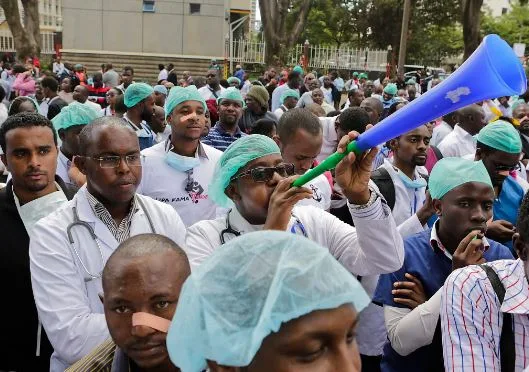Kenyan doctors in public hospitals started a comprehensive nationwide strike, citing the government’s failure to fulfil numerous pledges outlined in a collective bargaining agreement that dates back to 2017.
This agreement was forged following a harrowing 100-day strike period, during which tragic deaths occurred due to inadequate medical attention.
The strike underscores a longstanding frustration among doctors and healthcare workers who contend that the government has not upheld its commitments to improve working conditions, remuneration, and overall healthcare infrastructure despite previous agreements and negotiations.
The strike declared by the Kenya Medical Practitioners Pharmacists and Dentists Union (KMPDU) demanded comprehensive medical cover for the doctors because the government has yet to post 1,200 medical interns.
Despite the labour court order urging the postponement of the strike, approximately four thousand(4,000) Kenyan doctors proceeded with the nationwide strike.
In defence of the union’s decision, the secretary-general of KMPDU, Dr. Davji Bhimji alongside the union’s deputy secretary-general, Dr. Dennis Miskellah cited the government’s prior dismissal of three court orders mandating an increase in basic pay for Kenyan doctors and the reinstatement of suspended doctors.
Miskellah highlighted that medical interns represent a substantial 27% of the workforce within the country’s public hospitals.
Their notable absence due to the ongoing strike has resulted in a concerning situation where an increased number of ill individuals are being denied admission and treatment in hospitals. This predicament further exacerbates the strain on an already overburdened healthcare system.
According to Miskellah;
“Despite the tireless efforts of the medical professionals and their unwavering dedication to providing quality care to all Kenyans, the government’s response has been inadequate and devoid of the necessary urgency to resolve these issues effectively.”
Despite the strike, a commendable number of dedicated doctors have chosen to remain on duty, particularly in intensive care units (ICUs).
Their unwavering commitment aims to ensure that critical patients receive the vital care they require to survive, underscoring the ethical responsibility and dedication of healthcare professionals even amidst challenging circumstances.
Also Read: Zimbabwe’s Tobacco Production To Drop By 10%, Here’s Why
The secretary-general also accused the government of reluctance to resolve the issues raised by Kenyan doctors through the union. He said,
“Regrettably, the government has shown a lack of willingness to address these pressing concerns, leaving healthcare workers in a state of frustration and dismay. Therefore, it is with great disappointment that we announce the commencement of a nationwide strike starting from midnight today March 13, 2024.”
Speaking to the press, Miskellah shed more light on the challenges of Kenyan doctors, which includes frustration that has led so many to commit suicide.
Some other doctors got access to medical treatment through fundraising due to a lack of adequate amenities and health coverage.
This is not the first time Kenyan doctors are embarking on a nationwide strike.
In 2017, Kenya’s public hospital doctors initiated what became the country’s lengthiest strike, spanning a challenging 100-day period.
Their core demands revolved around key issues such as enhanced wages, the urgent need for rehabilitation and upgrading of deteriorating public health infrastructures, and consistent efforts in training and recruitment to combat a critical shortage of healthcare personnel.
During this strike, public doctors having undergone rigorous six-year university training were receiving basic salaries ranging from $400 to $850 monthly.
This income level stood in stark contrast to that of certain police officers, who had undergone significantly shorter training periods of just six months yet were earning comparable salaries.
Such disparities highlighted the systemic issues within Kenya’s public sector, particularly concerning the remuneration and recognition of vital healthcare professionals.










